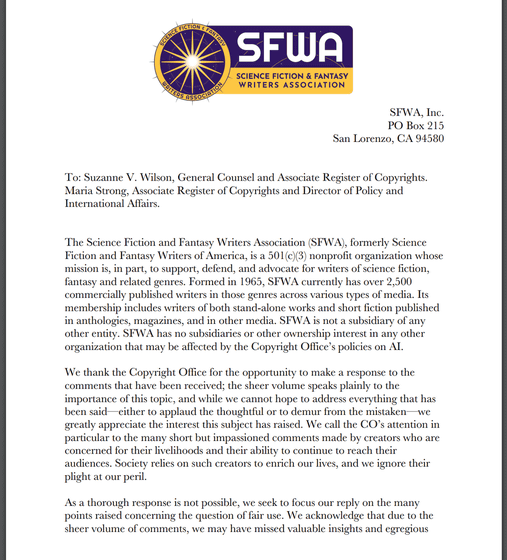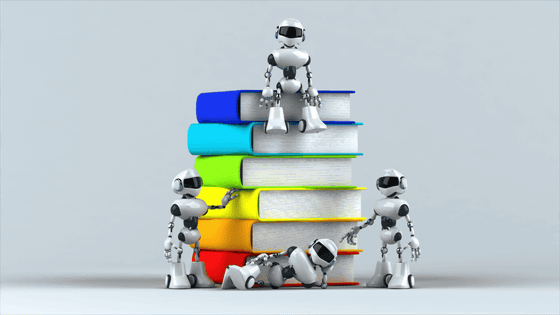SF writers request copyright authorities to regulate, saying ``AI training that abuses writers' generosity cannot be tolerated''

While generative AI can generate sophisticated texts and images, handling the data used to train the AI is often a problem.
SFWA Comments on AI to US Copyright Office - SFWA
https://www.sfwa.org/2023/11/03/sfwa-comments-on-ai-to-us-copyright-office/

Science Fiction and Fantasy Writers Take Aim at AI Freeloading * TorrentFrea
https://torrentfreak.com/science-fiction-and-fantasy-writers-take-aim-at-ai-freeloading-231213/

It is often pointed out that training datasets for training AI violate copyright and privacy. In the past, OpenAI, developed by ChatGPT, has been sued by a class action lawsuit over training data, and was asked by an anti-piracy group to delete 'Books3,' which was also used for training Meta's large-scale language model 'LLaMA.' There have been reports of requests being made. In addition, there have been cases where it has been discovered that the works used for learning were not obtained through legitimate means but were pirated copies, and the fact that the data is illegal has been called into question.
Author sues OpenAI for ``a pirated book was used to learn ChatGPT'' - GIGAZINE

SFWA is a non-profit organization with over 2,500 creators who publish works related to science fiction (SF) and fantasy.It investigates and warns against fraud in the publishing industry, arbitrates publishing troubles, and handles copyright issues. We support writers by investigating and dealing with issues. In response to the U.S. Copyright Office's call for public comment on issues posed by AI around August 2023, SFWA announced on October 30, 2023, ``Harm to the fiction market and copyright implications of AI tools.'' 'We need to once again make the issue of the threat known to legislators and bureaucrats,' they wrote to the U.S. Copyright Office.

SFWA's Board of Directors said, ``We are aware that there is a wide range of opinions within our community on the subject of AI and copyright.We want to make sure that legislators and bureaucrats are aware of this, and that writers are also encouraged to do so.'' We encourage people to learn about the impact AI will have on their careers. We need the right consensus to ensure that AI is created and used in ways that respect the rights of creative workers. It's a purpose,' he said.
The SFWA's argument is primarily concerned with the fact that 'AI is 'abusing' the generosity of these authors in a situation where the free sharing of books was encouraged from a fair use perspective.' I am. SFWA states that pirated books should not be used for AI training, and even books published by authors themselves should not be used unrestricted for AI training. I am.

'We have no offense when AI tools use members' copyrighted works for non-commercial purposes such as research and academics,' the letter states. 'However, turning AI and training data into commercial tools goes too far.' 'Rather than creative workers, including writers, benefiting or being paid for by AI, it is actually hurting the business of writing and publishing.' In conclusion, SFWA described the AI epidemic as 'just the beginning of a potentially devastating process for both creators and consumers.'
SFWA offers four 'remedies' to protect creators and preserve their ability to create in the future. First, sentences created by AI must be clearly labeled so that anyone can tell that they are created by AI. SFWA also requests that even if some of the work is created by AI, it should be clarified what percentage of the work is created by AI. Third, all licenses or legal rights in the training data must be demonstrated before copyright can be granted to AI-generated works. Finally, explicit rather than tacit permission should be obtained from the authors of the training data, and works created by AI without an explicit license should always be treated as infringing copyright. SFWA claims.
The end of the letter states, 'As writers of science fiction and fantasy, we hope that through the infinite ingenuity of the researchers who have brought AI systems to the world, we will find ways to conduct research that fully respects our rights. I am confident that you will be able to do so.'
Related Posts:
in Note, Posted by log1e_dh






